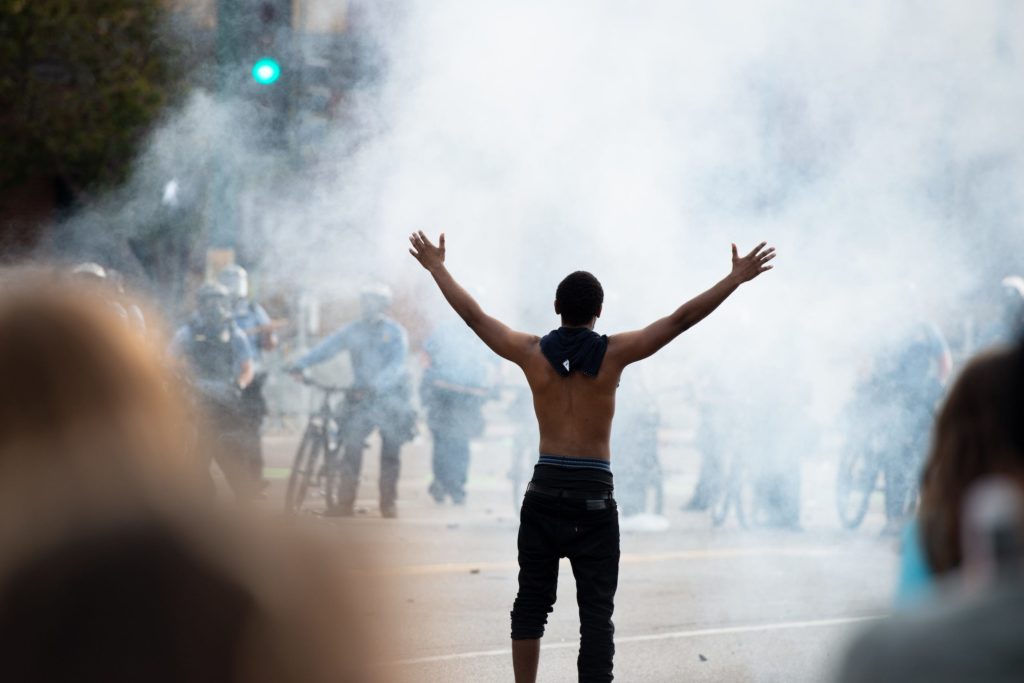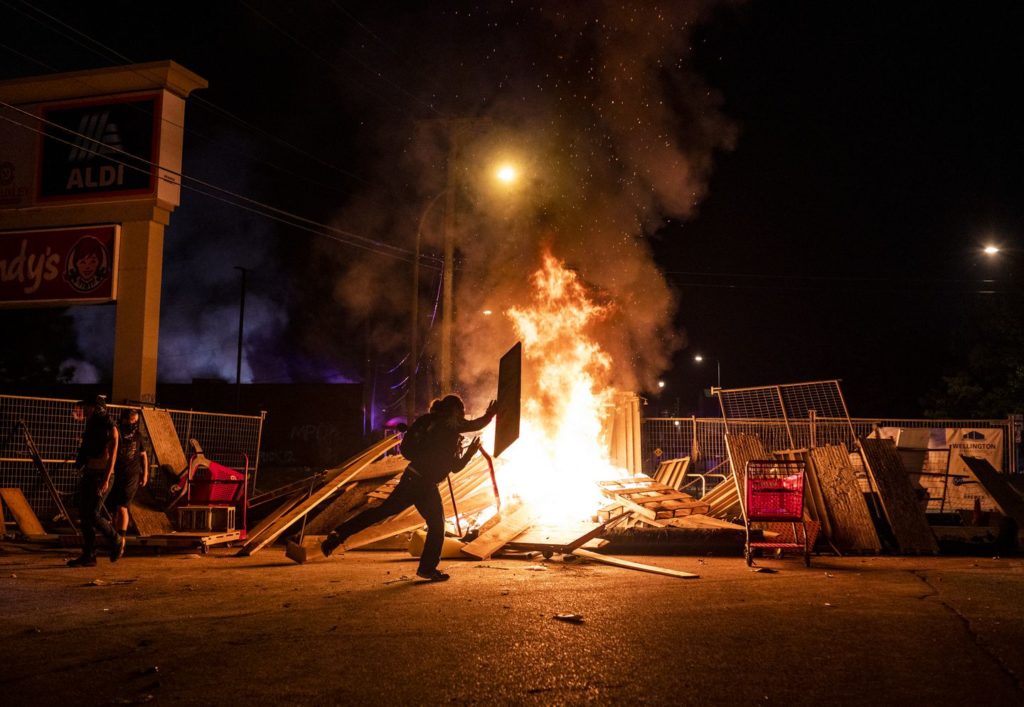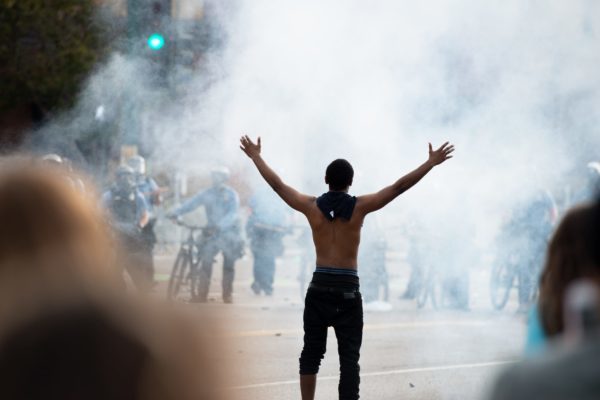BY: Christine Adams,
The protests that have erupted across the U.S. following the brutal deaths of George Floyd, Breonna Taylor and others at the hands of the police fit a pattern of long-term structural problems meeting sudden crises that historically have shaped revolutions in the past.

Steel Brooks/Anadolu Agency via Getty Images
As we grapple with what might change in the wake of covid-19 and unrest across the country, the case of the French Revolution of 1789 reminds us of the contested nature of social change. Revolutions do not necessarily erupt at the moment when people are most oppressed. Rather, revolutions have more often been the result of “rising expectations.” Periods of progress followed by crushed hopes can be especially dangerous, leading to rage and violence.
Alexis de Tocqueville was one of the first political theorists to highlight what he viewed as a curious paradox: the French Revolution erupted not when the nation was in the throes of decline, such as during the War of the Spanish Succession (1701-1714) in the later years of the reign of Louis XIV, but rather, at a time of relative prosperity in France. In his words, “A study of comparative statistics makes it clear that in none of the decades immediately following the Revolution did our national prosperity make such rapid forward strides as in the two preceding it.”

In fact, those parts of France that had experienced the greatest improvement saw the most pronounced popular discontent in the late 1780s and these became centers of revolutionary activity. Tocqueville attributed this to King Louis XVI’s (r. 1774-1793) relatively light hand over the country, and his desire to lessen the weight of absolutist rule: “For it is not always when things are going from bad to worse that revolutions break out. On the contrary, it oftener happens that when a people which has put up with an oppressive rule over a long period without protest suddenly finds the government relaxing its pressure, it takes up arms against it.”
However, historians have identified other factors. Yes, the lives of many French people were improving in the second half of the 18th century as epidemic disease and food shortages became less common, allowing for a decline in mortality. Overseas and domestic trade increased over the course of the century, making consumer goods such as sugar and coffee more widely available; the slave trade and the labor of enslaved people on plantations in France’s Caribbean colonies fueled the availability of these goods as well as French prosperity more generally. And Louis XVI, influenced by Enlightenment philosophy that called upon kings to rule in the interest of their subjects, did take into consideration the well-being of the French people. But things were not, in fact, going well in France in the years immediately preceding the Revolution in 1789.
The economy was in a downward spin. The Eden Treaty of 1786, negotiated to open trade between France and Great Britain, created terrible pressure on French industry and many thousands of textiles workers lost their jobs. The year 1788 was a terrible one for agriculture, and led to food shortages throughout the country, pushing many to leave home in search of employment. These roving bands of men triggered fear among the broader population already living close to the edge.
At the same time, the French government was grappling with bankruptcy, a legacy of its 18th-century wars, including its assistance to the American revolutionaries. The dire state of French finances was made public in 1786 when the last of the wartime taxes expired and it became clear the government was running a serious deficit. The controller-general tried to impose reforms to solve the fiscal crisis, including a broad-based tax, but was met with stiff resistance. The decision to call the Estates General to bring about financial and political reform, including a new constitution for the country, provided the catalyst for social unrest and violence, including the storming of the Bastille and the Great Fear, a series of peasant riots fueled by panic and conspiracy theories that spread across the French countryside in the summer of 1789.
The grim situation that the French faced in 1788 was made even worse by the fact that those suffering knew that life could be better. Why? Because they had a glimpse into a better future. The popularization of Enlightenment literature that critiqued inequalities in the social and political system along with the politicization of the French citizenry that had accompanied elections of the Estates General convinced many French men and women that political representation and a more just polity could bring about genuine change.
This fuller picture conforms to the late sociologist James Chowning Davies’s theory of political revolutions, which suggests that revolutions are a response to a downturn in the economy after a significant period of growth that allows individuals to envision a more promising future. A population subjected to unmitigated poverty and oppression cannot imagine a better alternative, and consequently, is unlikely to revolt. However, as life begins to improve and a happier life is conceivable, a sudden reversal of fortune can seem unbearable and trigger revolutionary activity.
This theory offers one way of thinking about the outbreak of revolution in France in 1789. The economic crisis of the years 1787-1788 created new and insufferable hardship throughout the country while a changing political culture, informed by Enlightenment philosophy, convinced many people that a more capable government could alleviate the hardship of its citizens. Rising expectations, dashed by economic downturn and royal incompetence, meant that the people of France were ready to take to the streets.
This theory may be playing out once again today. The gains of the civil rights movement made it possible to imagine that a future of racial equality was within reach. And when Barack Obama became president, it represented to many a powerful symbol of progress. But enduring inequality and police violence, and a highly visible white backlash that emerged in response to Obama’s election have been crushing. The covid-19 pandemic and the collapse of the economy have thrown into prominence the sharp disparities in this country, and exacerbated the stress and anguish of those suddenly facing economic catastrophe. These dashed expectations of a better life made recent incidents of police brutality, assertion of white privilege and other acts of racial violence all the more intolerable. It is not surprising that the murder of George Floyd was the match that lit the fuse.
(THE HOUR / Washington Post)


Leave a Reply
You must be logged in to post a comment.